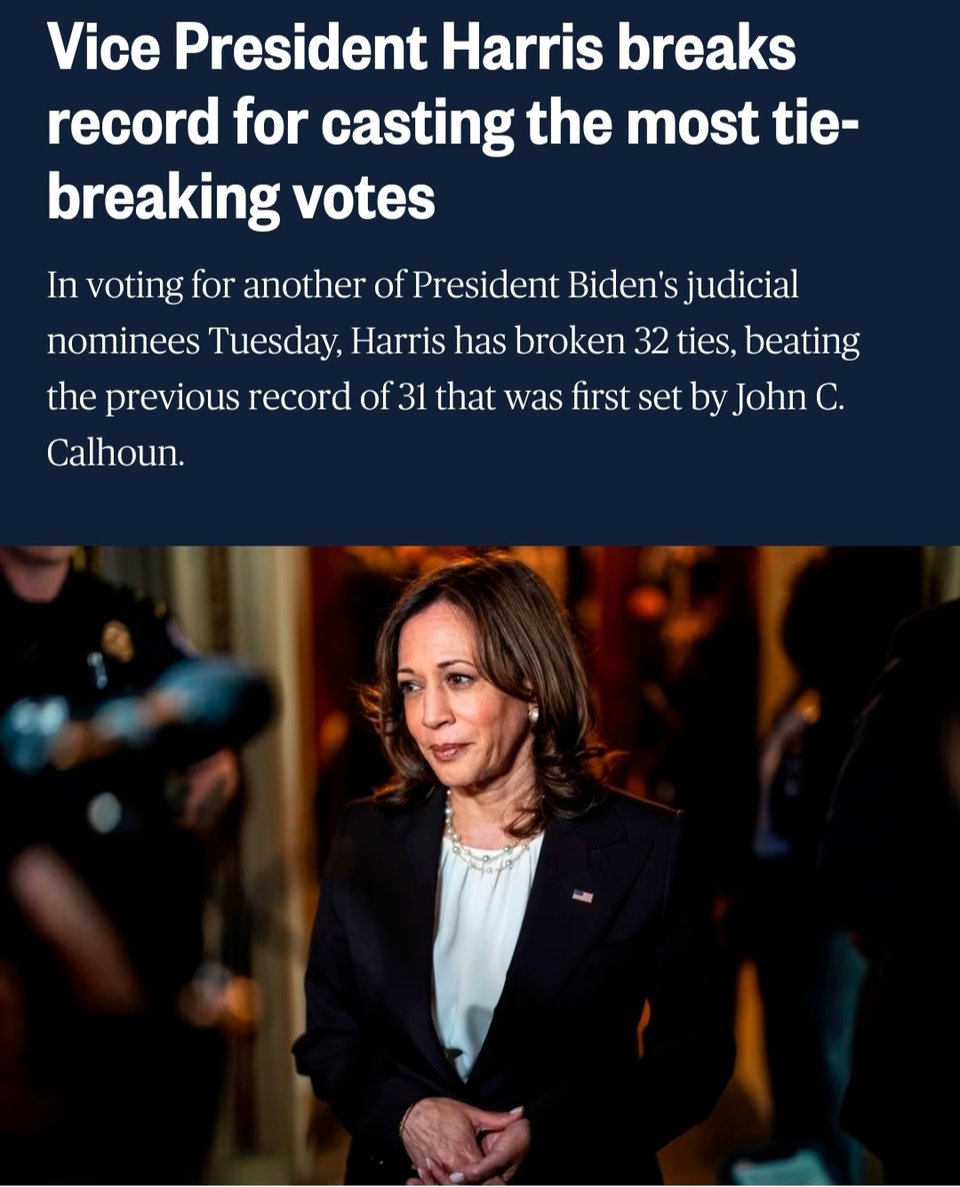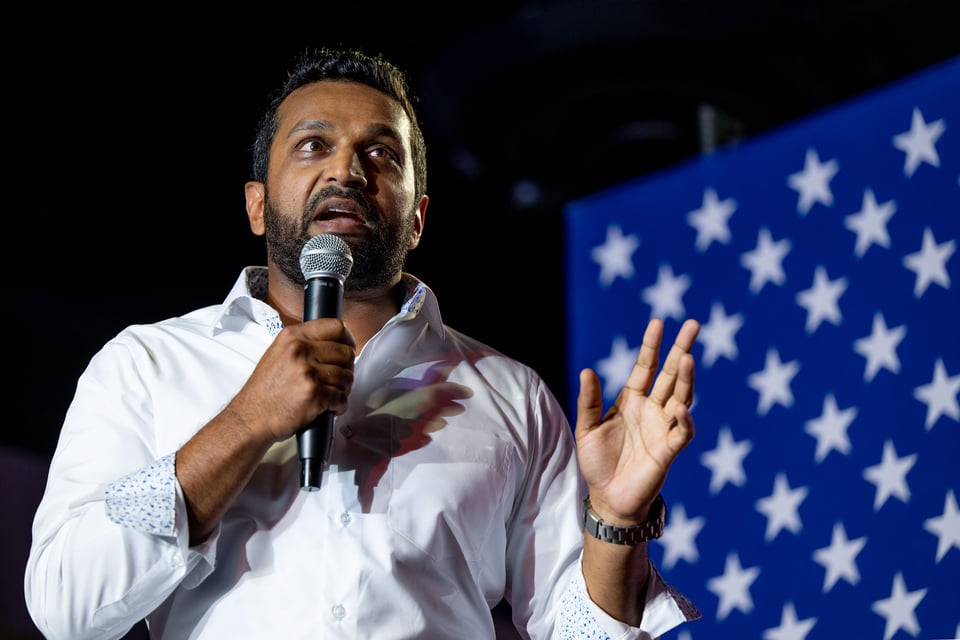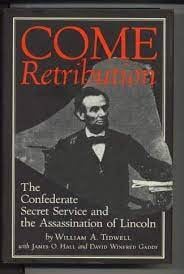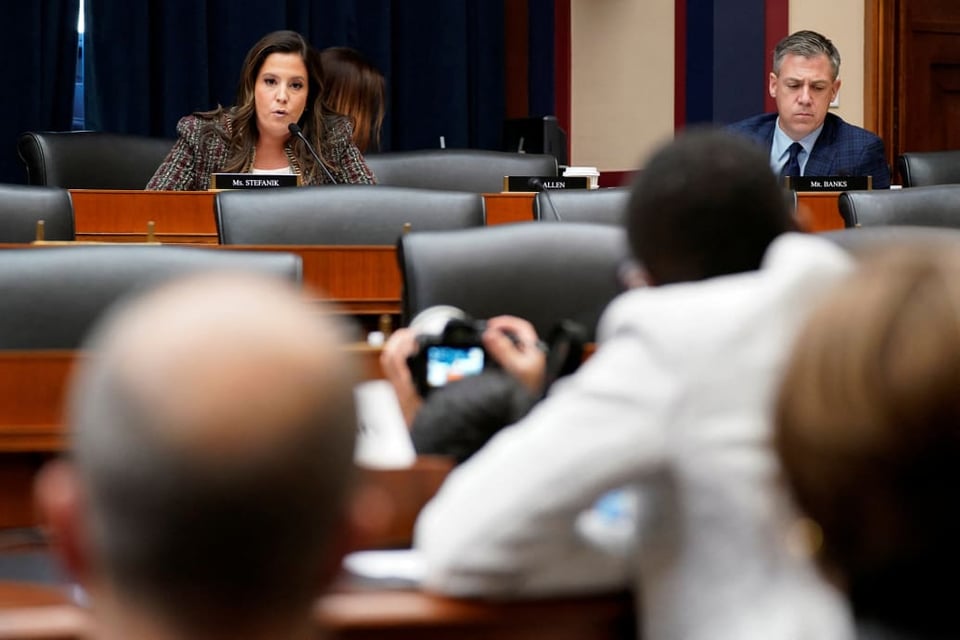Thursday, December 7,2023. Annette’s News Roundup.
I think the Roundup makes people feel not so alone.
To read an article excerpted in this Roundup, click on its blue title. Each “blue” article is hyperlinked so you can read the whole article.
Please feel free to share.
Invite at least one other person to subscribe today! https://buttondown.email/AnnettesNewsRoundup
______________________________
Joe is always busy.
Biden to sign executive order on federal funding for Native Americans - ABC News.
The President admitted yesterday. “If Trump wasn’t running, I’m not sure I’d be running.”
______________________________
Kamala is always busy.
The proof is here… she is always busy.

______________________________
More on the dangers of a Trump second term, if we don’t make that an impossibility.
Trump declines to rule out abusing power to seek retribution if he returns to the White House.

NEW YORK (AP) — Former President Donald Trump declined to rule out abusing power if he returns to the White House after Fox News Channel host Sean Hannityasked him Tuesday to respond to growing Democratic criticism of his rhetoric.
The GOP presidential front-runner has talked about targeting his rivals — referring to them as “vermin” — and vowed to seek retribution if he wins a second term for what he argues are politically motivated prosecutions against him. As Trump has dominated the Republican presidential primary, President Joe Biden has stepped up his own warnings, contending Trump is “ determined to destroy American democracy.”
“Under no circumstances, you are promising America tonight, you would never abuse power as retribution against anybody?” Hannity asked Trump in the interview taped in Davenport, Iowa.
“Except for day one,” Trump responded. “I want to close the border and I want to drill, drill, drill.”
A New Trump Administration Will ‘Come After’ the Media, Says Kash Patel.
Donald Trump, who has already promised to use the Justice Department to “go after” his political adversaries, is expected to install Mr. Patel in a senior role if he returns to power.

A confidant of Donald J. Trump who is likely to serve in a senior national security role in any new Trump administration threatened on Tuesday to target journalists for prosecution if the former president regains the White House.
The confidant, Kash Patel, who served as Mr. Trump’s counterterrorism adviser on the National Security Council and also as chief of staff to the acting secretary of defense, made the remarks on a podcast hosted by Stephen K. Bannon, Mr. Trump’s former strategist, during a discussion about a potential second Trump presidency beginning in 2025.
“We will go out and find the conspirators, not just in government but in the media,” Mr. Patel said. “Yes, we’re going to come after the people in the media who lied about American citizens, who helped Joe Biden rig presidential elections — we’re going to come after you. Whether it’s criminally or civilly, we’ll figure that out.” He added: “We’re actually going to use the Constitution to prosecute them for crimes they said we have always been guilty of but never have.”
Earlier in the interview, when asked by Mr. Bannon whether a new administration would “deliver the goods” to “get rolling on prosecutions” early in a second term, Mr. Patel noted that the Trump team had a “bench” of “all-America patriots,” but he said he did not want to name any names “so the radical left-wing media can terrorize them.”
A spokeswoman for Mr. Patel, Erica Knight, pointed out that in the same conversation with Mr. Bannon, Mr. Patel said they would “follow the facts and the law.” She also sent The New York Times a statement from Mr. Patel, reading, “When President Trump takes office in 2025, we will prosecute anyone that broke the law and end the weaponized, two tier system of justice.”
But Mr. Trump, who is facing 91 felony charges in four separate cases, has already promised to use the Justice Department to “go after” his political adversaries — signaling that a second Trump term would build on the ways it opened investigations into his enemies during his first term and fully abandon the post-Watergate norm of Justice Department independence.
“I will appoint a real special prosecutor to go after the most corrupt president in the history of the United States of America, Joe Biden, and the entire Biden crime family,” Mr. Trump said in June.
Mr. Patel was a relatively unknown Capitol Hill staffer in the early days of the Trump administration, in 2017, but he became an aggressive defender of Mr. Trump against the investigation into whether the president’s 2016 campaign conspired with Russians to affect the outcome. Over the next four years, he rose to become one of Mr. Trump’s most trusted aides and among the most powerful national security officials in the federal government.
In late 2020, Mr. Trump trusted Mr. Patel to such a degree that he asked for him to be installed as a deputy director of either the C.I.A. or the F.B.I. Mr. Trump jettisoned this plan only after senior officials, including the former C.I.A. director Gina Haspel and former Attorney General William P. Barr, argued forcefully against the move. Mr. Barr wrote in his memoir that he told Mark Meadows, then the chief of staff, that having Mr. Patel become deputy F.B.I. director would only happen “over my dead body.”
Over the past three years, since leaving government, Mr. Patel has capitalized on his fame as a Trump insider. He has sold “Kash” merchandise on an online store and wrote a children’s book about the Russia investigation in which a “King Donald” is persecuted by a wicked “Hillary Queenton.” The story’s hero is a wizard named “Kash” who exposes a conspiracy to tear down King Donald. Mr. Trump declared that he wanted to “put this amazing book in every school in America.”
Mr. Patel himself has filed defamation suits against The New York Times, CNN and Politico. And since leaving government he has set up a fund-raising entity to “fight the deep state” and finance lawsuits on behalf of the “everyday Americans” who he says have been “defamed” by what he calls “the fake news mafia.”
Mr. Patel’s threats against the news media echo warnings from Mr. Trump himself.
In a Truth Social post in September, the former president wrote: “I say up front, openly, and proudly, that when I WIN the Presidency of the United States, they and others of the LameStream Media will be thoroughly scrutinized for their knowingly dishonest and corrupt coverage of people, things, and events.” He added: “Why should NBC, or any other of the corrupt & dishonest media companies be entitled to use the very valuable Airwaves of the USA, FREE?”
In the same post, Mr. Trump wrote that “Comcast, with its one-side and vicious coverage by NBC NEWS, and in particular MSNBC,” should be “investigated for its ‘Country Threatening Treason.’”
Earlier this year, Mr. Trump recorded a video for his campaign website in which he promised that in a second term he would bring the Federal Communications Commission, which regulates broadcast licenses, “back under presidential authority as the Constitution demands.”
A spokesman for Mr. Trump, Steven Cheung, was asked if the former president disavowed Mr. Patel’s comments. Mr. Cheung did not answer the question directly, instead referring to a recent public statement from Mr. Trump’s top two campaign advisers that read, “Any personnel lists, policy agendas, or government plans published anywhere are merely suggestions. Likewise, all 2024 campaign policy announcements will be made by President Trump or members of his campaign team. Policy recommendations from external allies are just that — recommendations.”
Mr. Patel is among a small number of former senior national security officials from Mr. Trump’s first term who have stayed close to him. He was appointed by Mr. Trump in June 2022 to be one of his representatives to interact with the National Archives, whose officials had spent months the previous year trying to retrieve reams of presidential records that left the White House when Mr. Trump did, including classified material.
Mr. Patel told Breitbart News during an interview in 2022 that he had been on hand when Mr. Trump declassified documents before leaving office.
That interview attracted interest from federal investigators, who in May 2022 had subpoenaed any remaining classified documents that he hadn’t turned over. Three months later, the F.B.I. executed a search warrant to locate additional classified material at Mr. Trump’s Palm Beach club, Mar-a-Lago. Mr. Trump’s office claimed shortly after the search of the club that he had a standing order in place as president by which materials that left the Oval Office for the White House residence were considered declassified.
Several former senior officials, including former Vice President Mike Pence, said they knew of no such order.
Despite Mr. Trump’s obsession with news coverage and his need to stay in the headlines dating back to the 1980s, he has grown increasingly threatening toward the press throughout his life and particularly since his political campaigns began in 2015.
He has talked about changing libel laws to make it easier to sue over coverage. He repeatedly encouraged crowds at his rallies to antagonize the reporters gathered at the back covering the events. Once in office, he began referring to the press in public as “the enemy of the people,” language often used by despots globally to justify anti-press crackdowns.
He was obsessed with leaks. He wanted aides to interfere with the merger between AT&T and CNN, which covered him rigorously. And he told advisers he wanted officials to obtain phone records of a journalist covering him, a request that apparently was never fulfilled.
But Mr. Trump is suggesting there will be results next time.
“They are a true threat to Democracy and are, in fact, THE ENEMY OF THE PEOPLE!” Mr. Trump wrote in September on Truth Social. “The Fake News Media should pay a big price for what they have done to our once great Country!” (New York Times).
Trump's 'retribution' campaign theme has apparent roots in old Confederate code, new book says - ABC News.

Former President Donald Trump has repeatedly made a central theme of his 2024 White House bid clear: Retribution.
Now, the story behind that controversial theme is revealed in a new book by ABC News Chief Washington Correspondent Jonathan Karl.
In "Tired of Winning: Donald Trump and the End of the Grand Old Party," excerpts of which were first released in The Atlantic on Thursday, Karl reports that Trump's campaign message has its apparent roots in an old Confederate code.
While Trump half-heartedly launched his presidential campaign in November 2022, Karl writes, it wasn't until he stood on stage at the annual Conservative Political Action Conference (CPAC) in early March 2023 that his platform kicked into high gear.
"In 2016, I declared 'I am your voice.' Today I add: 'I am your warrior. I am your justice, and for those who have been wronged and betrayed, I am your retribution,'" Trump said at the time, roughly a month after his first indictment.
It was a language his longtime adviser Steve Bannon told Karl was his "Come Retribution" speech, according to the excerpts in The Atlantic.
Karl says Bannon suggested he read a book about the "Come Retribution" history.
"What I didn't realize was that 'Come Retribution,' according to some Civil War historians, served as the code words for the Confederate Secret Service's plot to take hostage -- and eventually assassinate -- President Abraham Lincoln," Karl writes.
Karl notes in the excerpts that while Trump's speech was not an "overt call for the assassination of his political opponents," it did push for their "destruction by other means."
Later that month, on March 25, Trump held the first rally of his 2024 campaign in Waco, Texas.
Karl reports that while Trump's team denied any symbolism between the choice of venue and the disastrous, deadly 1993 clash between government agents and the Branch Davidian religious sect, it was no coincidence.
"We're the Trump Davidians," Bannon told him "with a laugh," according to the excerpts.
But even as Trump was publicly pitching himself to the GOP base as its savior, there was one moment where he expressed doubt, according to the excerpts.
It was when New York Judge Juan Merchan set the trial date for the hush-money case against Trump. The former president was listening to the court proceeding on Zoom when he learned the trial would begin in March 2024 -- the same time as many of the Republican primaries.
According to The Atlantic excerpts, Trump turned to the lawyer sitting next to him in his Florida estate and unloaded.
"You are going to cost me the presidency!" he told him.
The Trump campaign disputed that the former president was angry with his lawyer about the trial date or accused him of jeopardizing his presidential campaign, saying, "President Trump and [Trump lawyer ] Mr. Blanche are united in fighting these unlawful witch-hunts and the weaponization of the justice system."
More.
“Donald Trump has been telling us exactly what he will do if he’s reelected and tonight he said he will be a dictator on Day 1,” Biden-Harris 2024 campaign manager Julie Chavez Rodriguez said after the Fox town hall with Hannity. “Americans should believe him.”
______________________________
McCarthy puts the screws to Speaker Mike Johnson.

Former Republican Congressman Kevin McCarthy, forced to give up the Speaker’s gavel in October, announced he will be stepping down at the end of this month. With Santos gone too, Republicans will soon have a majority of 2, only 2 more votes than the Democrats. In leaving before his term expires, McCarthy took no pity on Johnson - or his party.
______________________________
In case you missed the violent MAGA grilling of College Presidents about antisemitism on campus at the House on Tuesday…
First a detailed New York Times account…
Republicans Try to Put Harvard, M.I.T. and Penn on the Defensive About Antisemitism.

President Claudine Gay of Harvard (left) and President Elizabeth Magill of the University of Pennsylvania.
Harvard, the University of Pennsylvania and M.I.T. were hammered on Tuesday by Republican House members who claimed that the universities themselves had sown seeds of bias on campus against Jews.
“The antisemitism that we’ve seen on your campuses didn’t come out of nowhere,” said Virginia Foxx, Republican of North Carolina and chair of a House committee that invited the universities’ presidents to testify at a hearing about antisemitism on campus.
Claudine Gay of Harvard, Sally Kornbluth of M.I.T. and Elizabeth Magill of the University of Pennsylvania had come prepared for the hearing with speeches about the mundane details of university governance during a crisis. They testified that as the protests over the Oct. 7 Hamas attacks grew ugly, with clashes between pro-Palestinian and pro-Israel students, the police were called. Codes of conduct were consulted. Jewish students were asked about their fears. Task forces on antisemitism were formed. Freedom of expression was defended.
“Any form of hate is very contrary to our values,” Ms. Magill said.
But the Republican members of the House Committee on Education and the Workforce seemed to have little interest in speaking in the language of academia. They yoked rising antisemitism on college campuses to other hot-button issues that have helped animate G.O.P. politics for the last several years.
“We need fundamental cultural change for the university campuses,” Representative Kevin Kiley, Republican of California, said.
Over the course of the four-hour hearing, Republicans mentioned the influence of diversity, equity and inclusion programs, the inclusion of trans athletes, foreign funding for Middle Eastern studies, the paucity of conservative faculty and the declining percentage of Jewish students on campuses.
And so for much of the day, the presidents of some of the country’s most prestigious universities found themselves on the defensive in the face of mostly hostile questioning.
From the beginning of the Israel-Hamas conflict, the presidents have struggled to balance the free speech rights of pro-Palestinian protesters with the competing claims of Jewish students, who say that some of the rhetoric has spilled over into antisemitism. And the presidents have had to handle an increase in bias attacks for both sides.
They have also faced heavy criticism, and in some cases, a donor revolt, that they did not responded immediately to the concerns of Jewish students.
Dr. Gay, Harvard’s president, said she had not been oblivious to the horrors of the Oct. 7 attack, which killed about 1,200 people in Israel.
She said she would have been quicker to respond to a student letter that weekend blaming Israel for the Hamas attack had she known that it would be conflated with the views of the university administration.
But, she testified, “The notion that Harvard did not react is not correct.”
She said that she was busy responding behind the scenes, “focused on action.” The first day, she said, she was focused on determining whether there were Harvard students or faculty in Israel who needed help getting out. The day after the attack, on Oct. 8, she attended a Harvard Hillel solidarity dinner, trying to support Jewish students.
The admission did not win her points with Representative Elise Stefanik, Republican of New York, who graduated from Harvard in 2006. Representative Stefanik was the hearing’s de facto prosecutor, and members repeatedly yielded their remaining time to her cross-examinations.
At one point, she faulted Dr. Gay for declining a request to fly the Israeli flag over Harvard Yard. Dr. Gay said it was standard practice not to fly a foreign flag except for a visiting dignitary.
But, Representative Stefanik objected, Harvard had flown the Ukrainian flag.
That decision, Dr. Gay said, had been made by her predecessor.
“So it was an exception,” Representative Stefanik said, leaving the question hanging of why an exception had not been made for the Israeli flag.
Republicans also drilled down on antisemitic speech during the hearing. They repeatedly asked: What kind of speech warranted disciplinary action? Had students been punished, and how many? Could the presidents guarantee the safety of prospective Jewish students?
For the most part, university presidents evaded the questions.
Representative Stefanik, for example, said there had been marches where students had chanted in support of intifada, which means uprising but can feel to many Jews like a call for violence against them.
She asked Ms. Magill of the University of Pennsylvania, “Does calling for the genocide of Jews violate Penn’s rules or code of conduct, yes or no?”
Ms. Magill replied, “If the speech turns into conduct, it can be harassment.”
Representative Stefanik pressed: “I am asking, specifically calling for the genocide of Jews, does that constitute bullying or harassment?”
After some back and forth, Ms. Magill said, “It can be harassment.”
Representative Stefanik responded: “The answer is yes.”
The committee members also asked about ideological diversity. How many conservative professors did these universities employ? “We do not track that information,” Ms. Magill said.
“But conservatives are welcome,” Dr. Kornbluth of M.I.T. chimed in.
“I got the message,” Joe Wilson, Republican of South Carolina, said.
At least a few Democrats were frustrated. “The main point of this hearing should be to identify bipartisan solutions to combat antisemitism,” Representative Suzanne Bonamici, Democrat of Oregon, said well into the questioning, “not an excuse to attack higher education.” (New York Times).
More from the Times.
On Tuesday, the presidents of three leading American universities — Claudine Gay of Harvard, Sally Kornbluth of the Massachusetts Institute of Technology and Elizabeth Magill of the University of Pennsylvania — were at the center of a contentious congressional hearing on antisemitism on college campuses.
In one of the most notable exchanges, the leaders of the schools were pressed on whether they discipline students calling for the genocide of Jews. Their responses — “It is a context-dependent decision,” Ms. Magill answered at one point — drew widespread criticism.
But the administrators faced a barrage of other pointed questions at the hearing of the House Education and Workforce Committee, mainly from Republicans, who adopted a prosecutorial tone as they pushed for more definitive answers.
Here are some of those exchanges:
On chants for intifada on Harvard’s campus
In one instance, Representative Elise Stefanik, Republican of New York, pressed Ms. Gay over whether the university condoned chants of “intifada” on its campus.
Stefanik: Dr. Gay, a Harvard student calling for the mass murder of African Americans is not protected free speech at Harvard, correct?
Gay: Our commitment to free speech …
Stefanik: It’s a yes or no question. Is that correct? Is that OK for students to call for the mass murder of African Americans at Harvard? Is that protected free speech?
Gay: Our commitment to free speech …
Stefanik: It’s a yes or no question. Let me ask you this: You are president of Harvard, so I assume you are familiar with the term “intifada,” correct?
Gay: I have heard that term, yes.
Stefanik: And you understand that the use of the term “intifada” in the context of the Israeli-Arab conflict is indeed a call for violent armed resistance against the State of Israel, including violence against civilians and the genocide of Jews. Are you aware of that?
Gay: That type of hateful speech is personally abhorrent to me.
Stefanik: And there have been multiple marches at Harvard with students chanting, quote “There is only one solution: intifada, revolution” and quote “Globalize the intifada,” is that correct?
Gay: I’ve heard that thoughtless, reckless and hateful language on our campus, yes.
Stefanik: So based upon your testimony, you understand that this call for intifada is to commit genocide against the Jewish people in Israel and globally, correct?
Gay: I will say again, that type of hateful speech is personally abhorrent to me.
Stefanik: Do you believe that type of hateful speech is contrary to Harvard’s Code of Conduct or is it allowed at Harvard?
Gay: It is at odds with the values of Harvard.
Stefanik: Can you not say here that it is against the Code of Conduct at Harvard?
Gay: We embrace a commitment to free expression even of views that are objectionable, offensive, hateful — it’s when that speech crosses into conduct that violates our policies against bullying, harassment, intimidation…
Stefanik: Does that speech not cross that barrier? Does that speech not call for the genocide of Jews and the elimination of Israel? You testified that you understand that that is the definition of “intifada.” Is that speech according to the Code of Conduct or not?
Gay: We embrace a commitment to free expression, and give a wide berth to free expression even of views that are objectionable, outrageous and offensive.
Stefanik: You and I both know that that is not the case.
On a Palestinian writers festival at Penn
Since the Hamas attack in Israel, tempers have been particularly high at the University of Pennsylvania, where the campus was already up in arms over a recent Palestinian literary conference. The conference included speakers like Roger Waters, of the band Pink Floyd, who was invited to attend in person, but appeared by video. Mr. Waters has been criticized by the State Department for a history of using antisemitic tropes. Mr. Waters has supported Palestinian causes, but denies being antisemitic.
On Tuesday, Representative Jim Banks, Republican of Indiana, pressed Ms. Magill on whether the university had been consistent in its free speech policies. He began by asking her about why the university’s leadership did not stop the festival’s organizers from inviting Mr. Waters.
Banks: Why in the world would you host someone like that on your college campus to speak at the so-called Palestinian Rights Literature Festival?
Magill: I appreciate the opportunity to discuss this. Antisemitism has no place at Penn.
Banks: Why did you invite Roger Waters? What did you think you would get out of that?
Magill: Antisemitism has no place at Penn, and our free speech policies are guided by the United States Constitution.
Banks: Why did you invite Roger Waters?
Magill: Antisemitism does not have a place at Penn.
Banks: Do you condemn what Roger Waters stands for?
Magill: Congressman, prior to the event, I issued a statement calling out the antisemitism of some of the speakers at that conference.
Banks: Specifically Roger Waters, yes or no?
Magill: Roger Waters was among them.
Banks: So you specifically called out a guy who floated pig balloons with a Star of David at his concerts? I haven’t seen the condemnation, I’m going to go look for it after this hearing and I hope I can find that well-recorded condemnation from you.
Magill: I did call out the antisemitism of some of the speakers at a conference that had more than 100 people.
Banks: In the aftermath of the Palestinian Rights Festival, you and your board chairman wrote a memo outlining Penn’s free speech policies and you said, quote, “Penn does not regulate the content of speech or symbolic behavior,” you wrote, including speech, quote “incompatible with the school’s values.” And you went on to say Penn does not have a policy against hate speech because, quote, “defining and policing robust debate, even with respect to the most disturbing issues, is unwise.” That’s what you wrote.
But in 2013, Penn canceled now Prime Minister Modi’s scheduled keynote address at a Wharton-hosted economic forum in the face of opposition from Indian American professors. And for the past year the administration sought to punish Amy Wax, a tenured law professor, for her stance on D.E.I. and identity issues, and then you canceled an event with former ICE director Tom Homan due to disruptive student protests simply because he worked for former President Donald Trump.
Ms. Magill, the fact is that Penn regulates speech but that it doesn’t like. Everyone gets this, no one more than the faculty and students who know exactly where the lines are that they are OK to cross. Why did Penn let Prof. Ahmad Almallah off the hook, who led to hundreds of students in chanting, “There’s only one solution: intifada revolution”? Why does that professor still have a job at your university?
Magill: Representative, our approach to speech is as I identified, it follows and is guided by the United States Constitution, which allows for robust perspectives. I disagree with the characterization that we treat speech differently, and I can’t discuss any individual disciplinary procedure.
On flying Ukraine’s flag, but not Israel’s
Representative Stefanik also tried to draw out Dr. Gay of Harvard on what she implied was an inconsistency when it comes to showing support for foreign nations.
Stefanik: Dr. Gay, did anyone contact you about flying the Israeli flag over Harvard Yard?
Gay: Yes.
Stefanik: And the decision was made not to allow the flag to be flown over Harvard Yard?
Gay: It’s been standard protocol at the university for years to only fly the American flag unless we have a visiting dignitary.
Stefanik: So the decision was made to allow the Ukraine flag to be flown over Harvard Yard?
Gay: That was a decision made by my predecessor as an exception to a longstanding rule.
Stefanik: So it was an exception. So you made an exception for the Ukrainian flag, but not the — the university made an exception for the Ukrainian flag but not the Israeli flag.
Gay: That was a choice made by my predecessor.
Also, here is the full multi-hour hour video of the hearings.

If you just scroll forward at the video looking for her, you will have a chance to see Congresswoman Elise Stefanik do her best Gym Jordan imitation
One more thing
on Stefanik, the #2 in the MAGA Caucus, the bulldog previously most admired by Trumpers for endorsing and electingGeorge Santos.
Elise Stefanik’s Calculated Demagoguery on Antisemitism and Free Speech.

Whether for reasons of trauma or political expediency, people have lost their moral compasses when it comes to antisemitism on college campuses.
Case in point: by the time this article gets posted, the president of the University of Pennsylvania, Elizabeth Magill, may be out of a job, having fallen into a trap laid by Rep. Elise Stefanik (R-NY) at a congressional hearing Tuesday.
And yet, Magill was clearly right.
Here’s the exchange that may cost Magill her position. See if you can spot exactly where it goes off the rails:
STEFANIK: Ms. Magill, at Penn, does calling for the genocide of Jews violate Penn’s rules or code of conduct? Yes or no?
MAGILL: If the speech turns into conduct, it can be harassment. Yes.
STEFANIK: I am asking, specifically calling for the genocide of Jews, does that constitute bullying or harassment?
MAGILL: If it is directed and severe, pervasive, it is harassment.
STEFANIK: So the answer is yes.
MAGILL: It is a context-dependent decision, congresswoman.
STEFANIK: So calling for the genocide of Jews is, depending upon the context, that is not bullying or harassment. This is the easiest question to answer. Yes, Ms. Magill. So is your testimony that you will not answer yes? Yes or no?
MAGILL: If the speech becomes conduct. It can be harassment, yes.
STEFANIK: Conduct meaning committing the act of genocide? The speech is not harassment. This is unacceptable. Ms. Magill, I’m going to give you one more opportunity for the world to see your answer. Does calling for the genocide of Jews violate Penn’s code of conduct when it comes to bullying and harassment? Yes or no?
MAGILL: It can be harassment.
Magill is correct here, and answered with thoughtful nuance. Stefanik, on the other hand, is plainly wrong. There is no “Yes or No” answer to this question, because the answer depends on the context.
First, “calling for the genocide of Jews” is a preposterous phrase, because that’s not how hate speech works.
Even Hamas’ charter doesn’t state “we hereby call for the genocide of Jews.” They say “Israel… will continue to exist until Islam will obliterate it, just as it obliterated others before it.” In the end, it is indeed a call for genocide—but even that requires some interpretation.
More ambiguous phrases like “from the river to the sea” or “there is only one solution: intifada, revolution” would necessarily come with yet more layers of context. Rep. Stefanak said the latter counts as a call to genocide; others (including me) would disagree. Even the word genocide is hotly contested and ambiguous, with the word frequently being applied (inaccurately, in my view) at Israel at least as much as its enemies.
For that matter, I’ve heard countless Jews say that there is no such thing as the Palestinian people over the years (indeed, former Israeli Prime Minister Golda Meir said so). Is that a “call for genocide”? It’s certainly in the neighborhood.
I’ve heard right-wing Israelis call for “transfer” of Palestinian populations out of the West Bank. In the last month, I’ve heard them call for Palestinians to be pushed out of Gaza. Calls for genocide? Again, maybe, maybe not—subject to interpretation and context.
Second, the Penn policy is about bullying, harassment, and intimidation, not speech per se. So, exactly as Magill said, the answer to whether a given speech act violates that policy depends on its context.
If a torch-bearing mob marauds through a university campus while chanting “Jews will not replace us,” that is surely harassment and intimidation. When, a few weeks ago, a crowd of New York City high school students ran through the school’s halls, shouted “Free Palestine,” vandalized school property, and tried to barge into a classroom of a teacher who posted “I stand with Israel,” that wasn’t mere speech but, as Magill said, conduct that qualifies as harassment.
But what about when someone makes a statement in a classroom or a college lecture? If someone insists, in a classroom discussion, that Israel as a country is an illegitimate colonial outpost and should be “wiped off the map”?
That sounds like a political statement to me, not an act of bullying or intimidation. But if a mob marches into a Shabbat service and shouts the same slogan, then that’s clearly harassment and in violation of the policy. Context matters.
Of course, this is the subtlety one would expect from a university president, and also what we would expect a would-be demagogue to exploit, which is exactly what Stefanik did.
What’s more, the same civil libertarians who are the darlings of Republicans when they defend conservatives in this case have defended Magill.
In The New York Times’ report on the hearing, it quoted a spokesman for the Foundation for Individual Rights and Expression (FIRE)—an advocacy group that receives funding from the Charles G. Koch Foundation and is beloved by opponents of “cancel culture”—as saying that whether speech rises to the level of harassment “’is a complicated and fact-intensive issue’ that stems from a pattern of targeted behavior. ‘For example, it’s hard to see how the single utterance Rep. Stefanik asked about during the hearing—no matter how offensive—would qualify given this requirement.’”
Of course, this is the subtlety one would expect from a university president, and also what we would expect a would-be demagogue to exploit, which is exactly what Stefanik did.
Exactly right. But tell that to the mob of donors and alumni now demanding Magill’s head.
Of course, when it comes to conservative speech, Republicans like Stefanik are warriors against censorship of all kinds. In a 2021 interview, Stefanik complained of a “petition pressuring the dean of the Harvard Kennedy School to remove me from the bipartisan board of Harvard Institute of Politics,” due to her objecting to electors from four states in the 2020 election. “This is how cancel culture works,” she said.
But now Stefanik is practicing cancel culture on steroids. She and others are calling for Magill’s ouster—not for anything she personally said or did, but for merely stating that hateful antisemitic speech may or may not count as harassment, depending on the circumstances.
It’s cancel culture when it’s me, but not when it’s thee.
What I find most personally repellant about this whole spectacle is how it exploits the trauma and pain that the Jewish community is still feeling (while utterly ignoring the trauma and pain that Palestinians are experiencing).
Even those of us profoundly troubled by the extent of Israel’s military action in Gaza are still reeling from the massacres, rapes, and torture of Oct. 7. We are terrified by the rise in antisemitism in America and Europe. We are hurting.
But that’s what demagogues do, whether it’s Trump or Stefanik or anyone else: they pander to our fear and rage, and sublimate that pain into harmful actions.
Even more than the public square, universities are places where freedom of thought and expression are paramount. When speech crosses the line into harassment, those who threaten the safety of others must be held accountable—and I’m not defending the actions or inactions of Penn, Harvard, or any other institution.
But the spectacle of a demagogue urging a mob to punish an intellectual for articulately and accurately distinguishing between political speech and bullying? That is what I—as a journalist, lawyer, and rabbi—find chilling. ( Jay Michaelson, The Beast).
______________________________
Sheryl Sandberg spoke out.
This is her CNN op-ed published about six weeks after Hamas’s attack.I thought you might want to read it.
As she decided how to publicly engage on this crisis, Sandberg says she “felt a responsibility to speak out.” “I was enjoying a relatively private—still active with my foundation, but more private—life. I felt I had a responsibility to speak out…You can be for any side in this conflict. You can be for any solutions, and still be against rape.”
___
Sheryl Sandberg: Something we can all agree on | CNN

CNN) — Conflicting reactions to the recent attack on Israel and subsequent war in Gaza have led to heated and even violent disagreements in communities, colleges, Congress and coffee shops. People across the globe are protesting on all sides and shouting in the streets. But for one moment, I urge us to shift our focus from politics to humanity.
Because no matter which marches you are attending —or if you are attending none at all; no matter which flag you are flying — or if you are flying none at all; no matter what religion you practice — or if you practice none at all, there is one opinion that everyone can agree on: Rape should never be used as an act of war.
On October 7, Hamas terrorists committed unspeakable atrocities that we must speak about — and speak about loudly. Numerous witnesses have testified that sexual violence was widespread on that day, according to reports by Israeli investigators. An eyewitness has recounted the horror of watching a fellow concert-goer being gang-raped, then murdered. Rescue workers have reported recovering lifeless bodies, naked with their legs spread. Yet some are flat-out denying that these atrocities occurred. Even worse, some might actually believe that these women — mothers, daughters, sisters, and wives — ”deserved it.”
We have come so far in believing survivors of rape and assault in so many situations, yet this time, many are ignoring the stories that these bodies tell us about how these women spent the last moments of their lives.
The silence on these war crimes is deafening. It’s time to see beyond historical arguments about the past and political arguments about the future to denounce this now.
The silence on these war crimes is deafening.
Throughout history, women’s bodies were considered part of the destruction and spoils of war; sexual violence was widely viewed as an inevitable by-product of conflict rather than a grave offense. A breakthrough came just thirty years ago when the wars in the former Yugoslavia, Rwanda, Sierra Leone and the Democratic Republic of the Congo saw the devastating and deliberate use of mass sexual violence. This evoked a loud response from global women’s organizations and human rights activists. They yelled in horror and fought for change. Under pressure, the United Nations Security Council created the International Criminal Tribunal for the Former Yugoslavia (ICTY) in 1993 with an unprecedented commitment to prosecute rape as a crime against humanity along with other war crimes.
US leaders on both sides of the aisle, especially women, have taken a strong stand against the use of rape as a tactic of war. In 1995, then first lady and future secretary of state Hillary Clinton traveled to China, and in her famous “Women’s Rights Are Human Rights” speech, insisted that “it is a violation of human rights … when thousands of women are subjected to rape as a tactic or prize of war.” In 2008, addressing the use of sexual violence in armed conflict, Secretary of State Condoleezza Rice stated that “rape is a crime that can never be condoned.” The world agreed.
Not loudly condemning the rapes of October 7 — or any rapes — is a massive step backward for the women — and men — of the world. The ground gained was hard-fought and must not be lost. This is as true for Israel as for Ukraine where Russian soldiers have been accused of sexually brutalizing victims from ages four to 82. According to one United Nations report, a pair of Russian soldiers brutally raped a 22-year-old mother repeatedly and sexually assaulted her husband. Next, one of the soldiers raped their four-year-old daughter. Investigations of these reprehensible crimes are underway, but as always, prosecution of these cases is difficult. Cries for justice will help victims, who deserve our unconditional support.
Cries for justice will help victims, who deserve our unconditional support.
Dr. Denis Mukwege has spent his life providing medical, psychological and legal assistance to survivors of sexual violence in the Democratic Republic of the Congo. At Panzi Hospital, which he founded in 1999, he and his staff have cared for more than 50,000 survivors. Mukwege’s vocal advocacy against rape as a weapon of war has led to both an assassination attempt and a Nobel Peace Prize. As he accepted his award in Oslo, he declared, “With this Nobel Peace Prize, I call on the world to be a witness and I urge you to join us in order to put an end to this suffering that shames our common humanity.”
Today, it’s urgent that we add our voices to Mukwege’s. No matter what you believe should happen in the Middle East — I personally support a two-state solution where a Palestinian state and Israel co-exist so that both their populations can enjoy peace and security — we can surely unite against these atrocities. We can each “be a witness” and together call out this unacceptable horror and unimaginable suffering.
We must denounce these rapes in every conversation, at every rally, and on signs held on every street corner. We must forget our conflicting politics and remember our common humanity.
______________________________
Not an Andy Borowitz prank.
New Yorker Drops Andy Borowitz Satire Column Amid Cutbacks.

Humorist and writer Andy Borowitz has gotten the axe from the New Yorker after 25 years of writing for the magazine, as part of a larger wave of cost-cutting and layoffs at parent Condé Nast.
Borowitz announced that the New Yorker was dropping his long-running Borowitz Report satire features because of “its financial difficulties.”
In a post on Facebook, Borowitz wrote, “IF I MAY BE SERIOUS: Because of its financial difficulties, The New Yorker has been forced to cut costs. As a result, it has decided to stop publishing The Borowitz Report. I want to thank my colleagues at The New Yorker who have made writing for it such an honor for the past 25 years. And I want to thank you, my readers, for your incredible enthusiasm and support. You’re the reason I do what I do, and when I figure out what I want to do next, you’ll be the first to know. Love, Andy.” (Variety).
______________________________
Norman Lear, age 101, died on Tuesday.
Here is an appraisal from the New York Times.
Norman Lear, TV’s Greatest American.
The “All in the Family” producer made sitcoms into a form of patriotic dissent.

In 1942, Norman Lear signed up to fight the fascists. He served as a radio operator and gunner in a B-17 bomber named “Umbriago” by its crew, after a catchphrase of the comedian Jimmy Durante. As Lear watched bombs spill out of the plane’s belly over Germany, he said in a 2021 interview with the Yiddish Book Center, his attitude was “Screw ’em.” But there was also a complicating empathy: “I remember thinking, imagining a table of family, of Germans, sitting around the table as the bombs dropped.”
Lear, who died Tuesday at age 101, was hardly alone in volunteering to fight for his country in World War II. What distinguished his career as a TV producer was how he fought for his country in his sitcoms.
The most famous of them informed Americans that there was a war going on at their own kitchen tables. By January 1971, when “All in the Family” premiered, TV had been spilling a gusher of reality into living rooms — Vietnam, street protests, the Kent State shootings — but sitcoms had remained an alternative universe of goofy castaways, friendly witches and lovable millionaire bumpkins.
“All in the Family,” which Lear had spent years trying to develop for the networks, personified the country’s conflicts under one roof, at 704 Hauser in Queens. Archie Bunker (Carroll O’Connor), the racist, reactionary dockworker, was the choleric face of the kind of blue-collar workers, alienated by social change, who had attacked antiwar demonstrators in the “hard hat riots”the previous spring. He sparred with his feminist daughter, Gloria (Sally Struthers), and her leftist husband, Michael (Rob Reiner), while his anxious wife, Edith (Jean Stapleton), tried to keep an increasingly elusive peace.
Lear designed “All in the Family” to air arguments audiences weren’t hearing in escapist sitcoms. (Other sounds too: The pilot episode featured, for the first time on network TV, the noise of a flushing toilet—“terlet,” in Archie-speak — which was the show’s shot heard ’round the world.) Its format was theater-like, its dialogue rough and real, its comedy smart but not highbrow. It was a lightning revolution, claiming the No. 1 spot in the ratings and holding on for five years.
“All in the Family” was based on a British series, “Till Death Us Do Part.” The title of the original refers, of course, to wedding vows — that is, to the relationship between two people. The title “All in the Family” expanded that outward. The troubles were in our family, the fights were in our family, the racists were in our family. We were bound to them.
So Archie Bunker, for all his prejudice and bullheadedness, had to be vivid, alive, funny. Yes, there was a risk that audiences would laugh with his bigotry and not at it. But if you couldn’t like him, you couldn’t see how any of the other characters could love him. And if you couldn’t see that, then you couldn’t see the Archie in any of the people that you loved.
Lear’s connection to Archie was intimate. His own father, he told NPR, was “a bit of an Archie Bunker,” given to using racist language, and Lear based the character in part on him. But Archie was also, like Lear, a World War II veteran who had been based in Italy with the Army Air Forces.
Archie was an oaf and a bigot, but a richly human one. Lear’s depiction of him was — like much of his TV work — a critique that came from love. He imagined popular, populist TV as a form of patriotic dissent, embodying a spirit of big-hearted 20th-century liberalism.
Part of that philosophy, in Lear’s subsequent work, was opening the doors to other members of the American family whom Archie deplorably deplored from his favorite chair. He made TV about rich Black people (“The Jeffersons”) and working-class Black people (“Good Times,” “Sanford and Son”), about feminists (“Maude”) and divorced women (“One Day at a Time”) and dissatisfied housewives (“Mary Hartman, Mary Hartman”). He tried to establish a Latino family sitcom with the short lived “a.k.a. Pablo,” and later in life executive produced a reboot of “One Day at a Time” centered on a Cuban American family.
Lear was inspired in part, he said, by his own minority experience as a Jew in America, in the era of the antisemitic radio demagogue Father Charles Coughlin. In his TV work Lear built a counter-weapon, a bigger and better soapbox.

But he also made distinctive art. He created a bracing comedy language, able to play to both the cheap seats and the opera boxes. As successful as many of his shows were, they weren’t as widely imitated as their more feel-good contemporaries. Decades later, when someone attempts a show with a similar provocative spirit and theater-for-the-masses style — say, NBC’s “The Carmichael Show” a few years ago — Lear’s is still the first name that comes to mind for comparison.
His work also managed to stay relevant, even prescient, a half-century later, as became obvious with the presidency of Donald J. Trump, whose Queens bluster and bigoted “Those Were the Days” grievances echoed Lear’s most famous character. In 2017 — the same year that Lear refused in protest to attend a Kennedy Center reception at the White House — the former presidential adviser Steve Bannon said admiringly of the president, “Dude, he’s Archie Bunker.”
That an alt-right agitator could liken his chosen candidate to the character Lear wrote as a pigheaded buffoon — and see it as not just a compliment but an asset — could, you might argue, be the ultimate indictment of Lear’s gamble in making Archie likable.
But that approach also allowed Lear’s voice, his patriotic belief in pluralism, to carry in places where a stump speech wouldn’t. My own father was a blue-collar World War II vet who, like Lear’s, had a little Archie Bunker in him. Maybe more than a little. Yet when I was a kid, we’d watch “All in the Family” together.
I doubt that laughing with and at Archie did much to change my dad. But I think it helped shape me. “All in the Family” talked back, in a way I couldn’t as an elementary-school kid. It showed me that there were other points of view and that millions of other people were interested in the argument.
I don’t know if Norman Lear ever imagined the inside of a house like mine when he created his shows, the way he pictured the families inside German homes when he served in the war. But the same principle applied: Family life may be private, but it’s never insulated from the forces troubling the world. With his work, he tried to drop something into American living rooms that might, at least, leave us a little bit better. Thank you for your service, Mr. Lear. (New York Times).
______________________________
Happy First Night of Chanukah.

It’s all about the oils.
Chanukah - the Festival of Lights - is the story of how an insufficient amount of oil burned for 8 nights. Therefore, this holiday is all about foods cooked in oil.
Classic Potato Latkes by Melissa Clark from NYT Cooking.


______________________________